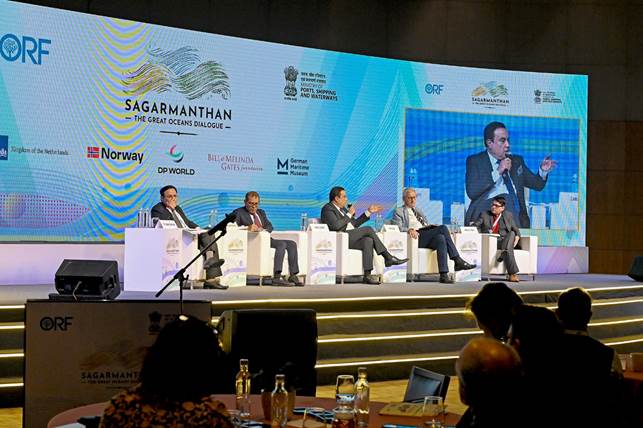New Delhi: The inaugural edition of Sagarmanthan – The Great Oceans Dialogue, a groundbreaking maritime forum organized by the Ministry of Ports, Shipping & Waterways (MoPSW) in collaboration with the Observer Research Foundation (ORF), concluded today with a resounding success. The dialogue, which gathered maritime experts, policymakers, and global leaders, focused on building partnerships and exploring solutions for the sustainable development of the maritime sector.
The event received a special message from Prime Minister Narendra Modi, who praised the dialogue’s success and highlighted its role in shaping the future of the oceans. In a message sent from his camp office in Nigeria, PM Modi emphasized India’s vision for a free, open, and secure maritime network, with a particular focus on the Indian Ocean and the Indo-Pacific region. He underscored the importance of the Indo Pacific Oceans Initiative in fostering global growth through the responsible use of marine resources, while also promoting peace, trust, and cooperation between nations.
“Our vision for a free, open and secure maritime network is resonating worldwide,” said PM Modi. “As we strive for a Viksit Bharat by 2047, dialogues like Sagarmanthan are essential in building consensus, partnerships, and a prosperous future for humanity.”
As South Asia’s largest maritime thought leadership forum, Sagarmanthan provided a premier platform for global leaders to share insights on key maritime themes such as the blue economy, global supply chains, maritime logistics, and sustainable growth. The event highlighted India’s ambition to become a major maritime nation by 2030, with Union Minister of Ports, Shipping & Waterways, Sarbananda Sonowal, leading discussions on the modernization of India’s maritime sector.
Minister Sonowal, addressing the forum on the second day, reiterated India’s commitment to becoming one of the world’s top shipbuilding nations by 2030 and a global leader in maritime trade by 2047. “India has the talent pool and resources to become a major shipbuilding nation. Our goal is to enter the Top 10 shipbuilding countries by 2030 and the Top 5 by 2047,” he stated. “This is integral to the vision of Prime Minister Modi’s Atmanirbhar Bharat and our journey toward becoming a global maritime powerhouse.”
The dialogue also focused on key challenges and opportunities in the maritime sector, including sustainability, circular blue economy, and fostering greener shipping practices. Technical experts from around the world, including from Mauritius, Kenya, South Africa, and Norway, engaged in deep discussions with Minister Sonowal on the future of sustainable maritime practices, highlighting the importance of collaboration between nations, industries, and coastal communities.
Union Minister Shantanu Thakur, who delivered the valedictory address, thanked the 1,700 delegates from 61 countries for their active participation and underscored India’s maritime strength. “Our ports are not just gateways to trade—they are engines of employment and sustainable development,” he said. “Under the visionary leadership of Prime Minister Modi, India is writing a bold, resilient, and inclusive chapter in its maritime history.”
The event also featured an engaging Ministerial Dinner Roundtable, where Union Minister Sonowal engaged with global maritime think tanks, and an expert session on ‘Euro Afro Asian Century: Connecting the Heartlands of Future Growth.’ Ruben Eiras, Secretary General of Forum Oceano, Portugal, highlighted the critical role of digitization and artificial intelligence in optimizing maritime routes and improving vessel dynamics. Experts also discussed how India’s growing inland waterways sector could be leveraged by other countries for global benefit.
In the session on ‘Energy and Shipping: Charting a Course to Sustainable Trade,’ global leaders such as Jonathan Christensen, CEO of the Global Maritime Forum, discussed the potential of green ammonia as a fuel alternative and its global implications. Similarly, in the session on ‘Rethinking Labour at Sea: Overcoming Enduring Inequalities,’ discussions centered around improving working conditions for seafarers and ensuring gender equality in the maritime industry.
The forum also spotlighted India’s quest to become a top ship manufacturing nation, with global experts discussing best practices for shipbuilding and the potential for India to modernize its fleet and infrastructure. Experts from the Netherlands, Panama, Norway, Egypt, and Australia engaged with Indian maritime leaders to discuss innovation in the shipbuilding sector and the importance of decentralized production.
Sagarmanthan’s themes—New Frontiers, Blue Growth Partnerships for Progress, Green and Blue, and Coasts & Communities—explored vital areas of maritime governance, sustainability, and social impact. With India’s growing influence as a maritime nation, these discussions are expected to play a crucial role in shaping a vibrant and future-ready maritime ecosystem.
India’s maritime sector continues to be a cornerstone of its economy, handling around 95% of its trade by volume and 70% by value. With its growing fleet and modernizing port infrastructure, India is well-positioned to play a pivotal role in global shipping and maritime trade in the years to come.
The Sagarmanthan – The Great Oceans Dialogue marks a significant step in India’s maritime journey, fostering global collaboration and charting a course toward a sustainable, prosperous, and interconnected future.





